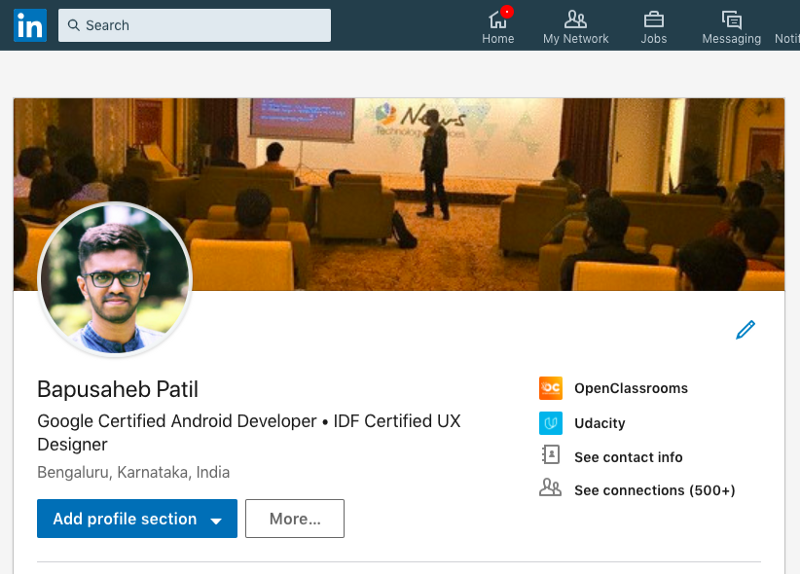by Bapusaheb Patil
How to line up a tech job while you’re still a student
Score that first tech job by showcasing your work — and yourself — the right way

I’m Bapusaheb Patil, I’m a Google Certified Android Developer, and I have about two years of experience working with Android. I study computer science and engineering in Bangalore, India, and I recently got a job offer with a company called OneDirect, as a Mobile Developer, after clearing 3 rounds of interviews.
How was the selection process, you might ask? Was it difficult for me to “impress them”? Were the tests and questions hurled at me a grueling experience?
Well, not exactly. But let me be clear: I didn’t necessarily know everything I needed to know, but I’d been doing this for quite a while. So at that point, it was just a matter of me showcasing my work and talking about it in the right way.
So why am I writing this article?
I’m writing this article to share my story and tell you how I got selected on-campus during undergrad. I’ll discuss how I built up my portfolio, my projects, and my online presence and got a junior developer job at a good company.
Even if you aren’t in development, I still think this article will still be a good blueprint for you to follow when deciding how to showcase your work and present yourself to tech recruiters.
Let’s start from the beginning…

I started Android development in the winter of 2015 with the free courses on Udacity. I was in my freshman year of college. I just found it very interesting, and got started with the basics of how to build a simple single-screen app.
After building a few apps and getting involved more in the Android community, I came across Git and GitHub. That changed the way I thought about my projects.
Projects, projects, projects!

You see, up until then, I thought about projects as something that I just coded and learned from. But being in the community, I learned from other developers that it’s just as important to showcase your projects as well. Even if it’s just a simple “Hello World” app. It may seem silly to you, but you need to do it anyway. Why?
Because it establishes your presence in your field.
It says, “My name is XYZ, I’m interested in this field, and I’ll be pursuing it in the near future”. It sends a signal to anyone (wink wink, recruiters) who’s looking at your online profile that you might be a good potential candidate for a job, for example.
It tells people what you’re passionate about.

Developing skills within your field of interest is super important, sure. But showcasing and being able to talk about those topics at length matters a lot as well. And if you’re a developer, GitHub is an amazing way to showcase your projects. It has “repositories”, which are basically like online folders for your projects.
I started uploading all my apps onto GitHub. Over time, the apps got more sophisticated.
When I applied to the job at OneDirect, I had 52 repositories on GitHub, and three of my apps were on the Google Play Store. That made a huge difference when the Engineering Lead came across my profile. ;-)
This brings me to the next world which demands your attention: LinkedIn.
“Bapu, do I really need LinkedIn?”
Yes. Yes, you do.
Think of LinkedIn as the Facebook/Instagram of jobs, recruiters, and opportunities.
It’s one of the top portals that recruiters use to scout talent. How you portray yourself on LinkedIn helps the recruiter or anyone else looking at your profile decide whether you’re competent in your field of interest.
Your LinkedIn profile tells a story about you. So don’t neglect it.

So create a LinkedIn profile if you haven’t already. Make sure you’ve added your skills, education, courses, and projects in your LinkedIn profile. Go ahead, write a good title and a short bio for yourself — this is usually displayed at the top of your profile, right underneath your name. Ask your friends to endorse you for your skills on LinkedIn (they confirm that you have those skills you list).
LinkedIn is a good way to make your online presence better and tell a good professional story about yourself. Needless to say, I put a lot of time and effort into making my LinkedIn profile look good.
Okay, what’s next?
Once you’re done with setting up your GitHub and LinkedIn profiles, it’s time to get started on designing and writing that résumé people keep talking about.

If you’re looking for a good online résumé builder, I’d recommend Novoresume.
But with regards to the content of the résumé, here are some things to keep in mind:
- Make sure that there are no spelling mistakes
- List your education, any achievements you may have, your projects, and a one-line description for all of them, at the very least
- Mentioning things like “captain of the football team” probably isn’t gonna help you get a tech job. Recruiters just don’t care about that stuff.
Here’s a link to my résumé so you can check it out. And now, let’s move on to…
The interview process

I’ve been to a lot of job interviews, but the interview for my current job was the longest one. I went in for the selection process at 08:30AM, and after my application got accepted they let me know that I was allowed to proceed further.
The selection process consisted of 3 rounds:
Round 1
We were given a sheet of paper and 3 questions. They were algorithm-based questions, and we were required to write code or an algorithm to solve them in 1 hour. They weren’t exactly easy, but I thought that if I were to solve at least 1 or 2, or even able to come up with a partial solution which elaborated on my thought process, it would be enough to get me to the next round. And so I got through, after being able to solve one question fully and two partially.
So, strengthen your critical thinking and problem-solving skills.
Funnily enough, the Engineering Lead of the company came up to me and recognised me instantly (thanks to my online presence) after the 1st round. He was super-friendly, we talked to each other for a minute, and then he went away to evaluate our solutions.
Round 2
The second round of the process was mostly a technical round, with a few personal questions. They asked me questions regarding algorithms, data structures, operating systems, networking and Android development.
For technical interviews, I’d recommend that you have a strong foundation in all crucial technical aspects of your field of interest.
Technical knowledge is critical.
Round 3
The third round of the process was more of a HR round. I was asked a few questions regarding certain situations:
- what would I do if something went wrong and I had to report it to my boss
- what would I do (with respect to my job) if my family were to move to another city
And so on. Just make sure you tackle these questions without getting nervous and stay true to yourself.
Interviewers are just humans. There’s absolutely no need to fear them.
They need you to be as confident as possible for them to even consider you for the job.
I went home at 06:30PM that day. Just as I was about to put my phone on the charging dock, I got a call from my placement officer from college who informed me that I got selected for the role of Mobile Developer at OneDirect.
I start my job there in January of 2019. Until then, I’m just focusing on improving my Android knowledge, learning iOS and Flutter, and building some good projects — both for the job and for my personal growth.
The takeaways
So the takeaways here are that if you want that entry-level tech position in that company, focus on:
- Your GitHub profile
- Your LinkedIn profile
- Your résumé
- Your technical knowledge
- Your communication skills
I hope this article helps you prepare for that great job!
Hit the ? button if you liked this article and share it on your socials!
My Website:
Bapusaheb Patil
A Google Certified Android Developer who loves making apps, watchfaces & memes.bapspatil.com
LinkedIn:
Bapusaheb Patil - Android & UX Design Mentor - OpenClassrooms | LinkedIn
View Bapusaheb Patil's profile on LinkedIn, the world's largest professional community. Bapusaheb has 4 jobs listed on…linkedin.com
GitHub:
bapspatil (Bapusaheb Patil)
bapspatil has 56 repositories available. Follow their code on GitHub.github.com
